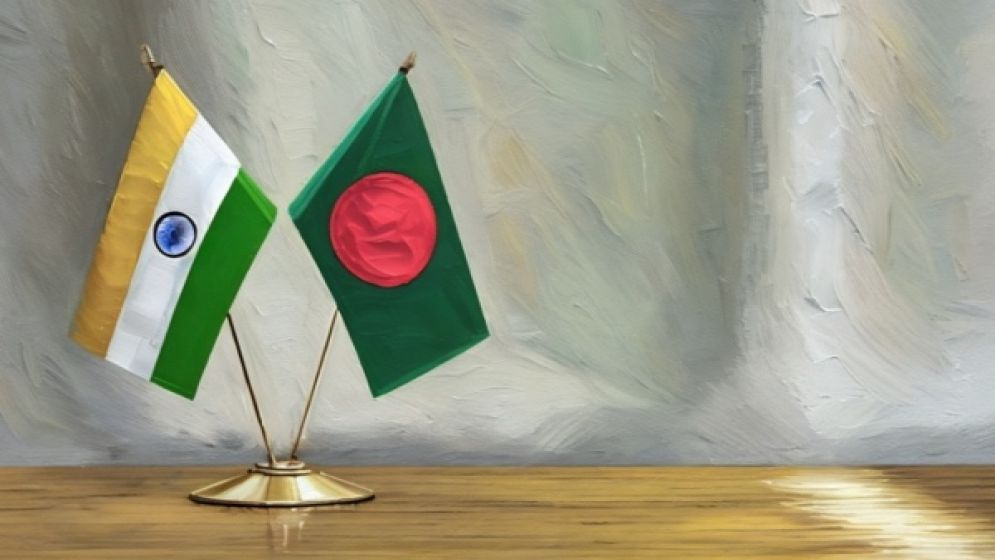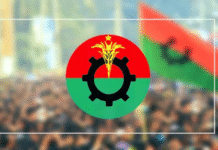
Abu Jakir
In a significant development on Wednesday, members of India’s Parliamentary Standing Committee on External Affairs raised pointed questions regarding the status and privileges afforded to Bangladesh’s former Prime Minister, Sheikh Hasina, who has been residing in India since her ouster.
The inquiry, which took place during a closed-door meeting in New Delhi, was directed at Foreign Secretary Vikram Misri.
While Misri’s immediate response to the queries has not been made public, his subsequent briefing to the committee offered a glimpse into the intricacies of India’s diplomatic stance toward Bangladesh, including sensitive aspects of bilateral relations.
The meeting, chaired by Congress leader Shashi Tharoor, provided a platform for Misri to outline key elements of his recent diplomatic mission to Dhaka, where he engaged with prominent figures within Bangladesh’s interim government.
His discussions focused on the evolving political landscape in Bangladesh, particularly under the leadership of Dr. Muhammad Yunus, the head of the interim administration of Bangladesh.
Misri took the opportunity to clarify India’s position on Sheikh Hasina, who, despite her controversial exit from power, remains an influential figure in Bangladesh’s political discourse.
The Foreign Secretary firmly stated that India does not endorse Hasina’s ongoing criticisms of the current interim government.
This remark is likely to be seen as an effort by India to distance itself from the internal political tensions within its neighbor.
Moreover, Misri underscored the broader, long-standing nature of India-Bangladesh ties, emphasizing that these relations transcend the interests of any single political party or government.
Instead, he pointed to the robust people-to-people connections that underpin the two nations’ bilateral cooperation.
Addressing concerns over Hasina’s political activities in India, Misri clarified that she had been using personal communication devices to make her public statements.
He further rejected any allegations that India had provided her with a formal platform for such activities, reaffirming India’s consistent policy of non-interference in the domestic affairs of its neighboring countries.
This, he stated, was in line with India’s foreign policy tradition, which has been careful to maintain neutrality in the internal politics of Bangladesh.
As the session concluded, the committee members, while receiving Misri’s responses, appeared keen on further scrutinizing the nature of India’s support for Sheikh Hasina in the face of an increasingly polarized political climate in Bangladesh.
India provides clarification but what does it mean
The Foreign Secretary’s clarifications, while offering some insight, have left many questions unresolved, suggesting that the issue of Hasina’s status in India may continue to spark debate within both Indian and Bangladeshi political circles.
Mahbub Alam, a leading political analyst, argues that India’s relationship with Bangladesh must prioritize broader national interests over aligning with any single political figure or faction.
“India’s ties with Bangladesh should be based on the national good, not personal or partisan politics,” Alam told the media, underscoring the need for strategic continuity in foreign relations rather than momentary political considerations.
At the same time, Hasina’s continued presence on Indian soil has exacerbated tensions between New Delhi and Dhaka.
In Bangladesh, the Interim Government, led by Dr. Yunus has moved to intensify pressure on India for her extradition.
A pivotal element of the controversy stems from an arrest warrant issued by the International Crimes Tribunal (ICT) in Bangladesh.
The tribunal accuses Hasina of crimes against humanity, with prosecutors alleging that she played a central role in orchestrating brutal crackdowns during violent protests earlier this year that left over 1,000 people dead.
These allegations have only added fuel to the fire, placing India in the delicate position of balancing legal obligations with political and humanitarian concerns.
Toby Cadman, a prominent human rights lawyer who advises the ICT, has called on India to respect Bangladesh’s judicial process, citing the principles of international law.
“As a democratic nation, India should honor any formal request from Bangladesh to extradite Sheikh Hasina,” Cadman stated following a meeting with ICT officials, emphasizing the importance of upholding international norms.
Asif Nazrul, Bangladesh’s legal adviser, has insisted that India is legally bound by a 2013 extradition treaty to return Hasina if formally requested.
However, the treaty includes provisions that allow India to refuse extradition in cases involving political offenses—a potential avenue India may pursue to avoid action that could disrupt bilateral relations.
Indian officials have been circumspect in their public statements. “She came here for safety reasons and continues to stay,” Randhir Jaiswal, a spokesperson for India’s Ministry of External Affairs, remarked recently, subtly emphasizing the humanitarian grounds on which Hasina’s presence in India is justified.
Bangla Outlook









